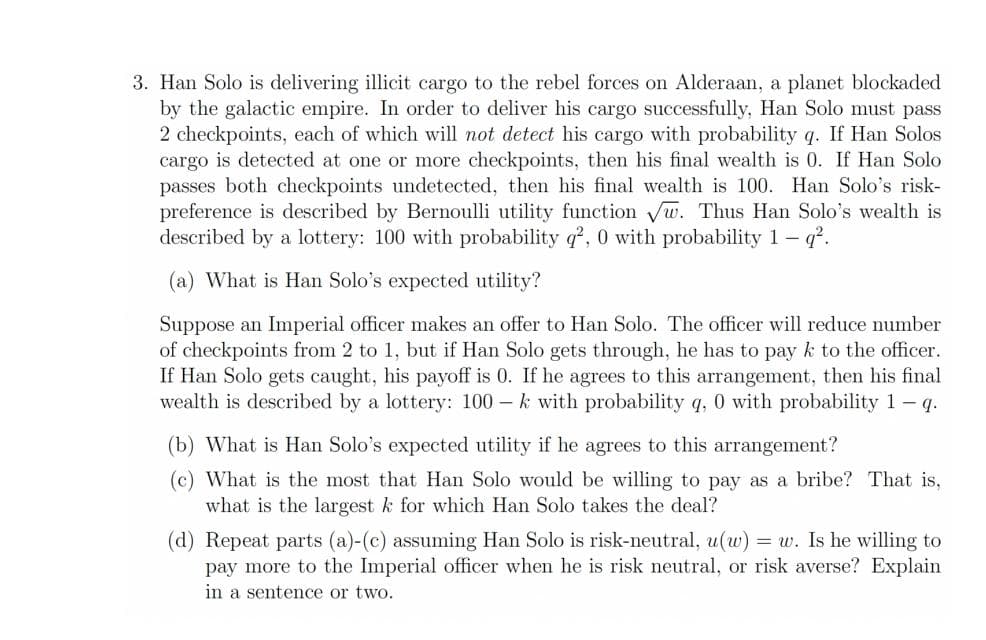3. Han Solo is delivering illicit cargo to the rebel forces on Alderaan, a planet blockaded by the galactic empire. In order to deliver his cargo successfully, Han Solo must pass 2 checkpoints, each of which will not detect his cargo with probability q. If Han Solos cargo is detected at one or more checkpoints, then his final wealth is 0. If Han Solo passes both checkpoints undetected, then his final wealth is 100. Han Solo's risk- preference is described by Bernoulli utility function w. Thus Han Solo's wealth is described by a lottery: 100 with probability q, 0 with probability1- q². (a) What is Han Solo's expected utility? Suppose an Imperial officer makes an offer to Han Solo. The officer will reduce number of checkpoints from 2 to 1, but if Han Solo gets through, he has to payk to the officer. If Han Solo gets caught, his payoff is 0. If he agrees to this arrangement, then his final wealth is described by a lottery: 100 – k with probability q, 0 with probability 1- q. (b) What is Han Solo's expected utility if he agrees to this arrangement? (c) What is the most that Han Solo would be willing to pay as a bribe? That is, what is the largest k for which Han Solo takes the deal? (d) Repeat parts (a)-(c) assuming Han Solo is risk-neutral, u(w) = w. Is he willing to pay more to the Imperial officer when he is risk neutral, or risk averse? Explain in a sentence or two.
3. Han Solo is delivering illicit cargo to the rebel forces on Alderaan, a planet blockaded by the galactic empire. In order to deliver his cargo successfully, Han Solo must pass 2 checkpoints, each of which will not detect his cargo with probability q. If Han Solos cargo is detected at one or more checkpoints, then his final wealth is 0. If Han Solo passes both checkpoints undetected, then his final wealth is 100. Han Solo's risk- preference is described by Bernoulli utility function w. Thus Han Solo's wealth is described by a lottery: 100 with probability q, 0 with probability1- q². (a) What is Han Solo's expected utility? Suppose an Imperial officer makes an offer to Han Solo. The officer will reduce number of checkpoints from 2 to 1, but if Han Solo gets through, he has to payk to the officer. If Han Solo gets caught, his payoff is 0. If he agrees to this arrangement, then his final wealth is described by a lottery: 100 – k with probability q, 0 with probability 1- q. (b) What is Han Solo's expected utility if he agrees to this arrangement? (c) What is the most that Han Solo would be willing to pay as a bribe? That is, what is the largest k for which Han Solo takes the deal? (d) Repeat parts (a)-(c) assuming Han Solo is risk-neutral, u(w) = w. Is he willing to pay more to the Imperial officer when he is risk neutral, or risk averse? Explain in a sentence or two.
Chapter7: Uncertainty
Section: Chapter Questions
Problem 7.5P
Related questions
Question

Transcribed Image Text:3. Han Solo is delivering illicit cargo to the rebel forces on Alderaan, a planet blockaded
by the galactic empire. In order to deliver his cargo successfully, Han Solo must pass
2 checkpoints, each of which will not detect his cargo with probability q. If Han Solos
cargo is detected at one or more checkpoints, then his final wealth is 0. If Han Solo
passes both checkpoints undetected, then his final wealth is 100. Han Solo's risk-
preference is described by Bernoulli utility function Vw. Thus Han Solo's wealth is
described by a lottery: 100 with probability q?, 0 with probability 1- q.
(a) What is Han Solo's expected utility?
Suppose an Imperial officer makes an offer to Han Solo. The officer will reduce number
of checkpoints from 2 to 1, but if Han Solo gets through, he has to pay k to the officer.
If Han Solo gets caught, his payoff is 0. If he agrees to this arrangement, then his final
wealth is described by a lottery: 100 – k with probability q, 0 with probability 1- q.
(b) What is Han Solo's expected utility if he agrees to this arrangement?
(c) What is the most that Han Solo would be willing to pay as a bribe? That is,
what is the largest k for which Han Solo takes the deal?
(d) Repeat parts (a)-(c) assuming Han Solo is risk-neutral, u(w) = w. Is he willing to
pay more to the Imperial officer when he is risk neutral, or risk averse? Explain
in a sentence or two.
Expert Solution
This question has been solved!
Explore an expertly crafted, step-by-step solution for a thorough understanding of key concepts.
Step by step
Solved in 3 steps

Knowledge Booster
Learn more about
Need a deep-dive on the concept behind this application? Look no further. Learn more about this topic, economics and related others by exploring similar questions and additional content below.Recommended textbooks for you


Brief Principles of Macroeconomics (MindTap Cours…
Economics
ISBN:
9781337091985
Author:
N. Gregory Mankiw
Publisher:
Cengage Learning

Essentials of Economics (MindTap Course List)
Economics
ISBN:
9781337091992
Author:
N. Gregory Mankiw
Publisher:
Cengage Learning


Brief Principles of Macroeconomics (MindTap Cours…
Economics
ISBN:
9781337091985
Author:
N. Gregory Mankiw
Publisher:
Cengage Learning

Essentials of Economics (MindTap Course List)
Economics
ISBN:
9781337091992
Author:
N. Gregory Mankiw
Publisher:
Cengage Learning